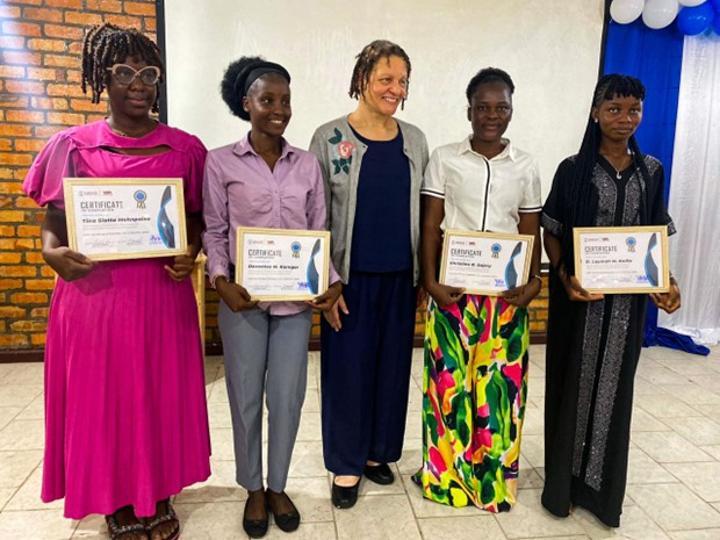Africa-Press – Liberia. The iCampus buzzed with excitement on December 12 as Youth Media Action (YMA) celebrated the graduation of journalists from a groundbreaking 48-hour social justice reporting workshop. The certification ceremony hailed as a milestone for women in Liberian journalism, showcased the transformative journey of four women journalists who are now poised to amplify marginalized voices and tackle systemic injustices.
The event was graced by representatives from USAID, the Female Journalists Association of Liberia (FeJAL), newspaper editors, and reporters. It underscored the critical role of empowering women journalists to bring human rights stories to the forefront of Liberia’s media landscape.
In his opening remarks, YMA Executive Director Varmah Kamara thanked USAID Liberia and the Civil Society Activity for their support, calling the training a major step in Liberia’s media development.
“This certification is not just a recognition of the hard work these journalists put in,” Kamara said. “It is a reaffirmation of YMA’s dedication to inspiring media reforms, professional journalism, and a vibrant democracy.”
The training combined theory and practice, equipping participants to understand social justice principles, identify systemic issues, and report empathetic stories. Lead facilitator and YMA Social Justice Consultant, Graziana Solano, reflected on the program’s impact, particularly its focus on empowering women.
“Why women?” Solano asked. “Only 34% of Liberian women are educated, and 74% are concentrated in informal sector jobs. Investing in this underserved group is essential. These women have their own dreams and aspirations, and this training is about encouraging them to reach their full potential.”
Participants shared powerful testimonials about the training’s impact on their professional growth and perspectives.
“It was a privilege to be part of this transformative journey,” said Inquirer Newspaper journalist Decontee Karnga. “The training equipped us with the tools and knowledge to report on social justice issues in Liberia. Watching video documentaries gave us a clear picture of these issues, and it developed a strong mindset towards social justice reporting. If more of this training is conducted across Liberia, we will have more journalists and newsrooms focusing on these critical topics.”
Tina Mehnpaine from the Daily Observer emphasized the value of the practical resources provided. “For me, the most important part of this training was the equipment. We don’t just possess the knowledge; we also have the materials to implement it. The training was impactful, and I believe it will have a long-term effect on our careers,” she said.
Laymah Kollie of Women TV Liberia reflected on the gaps in current reporting. “Through this training, I realized that we, as journalists, haven’t been doing enough to report on social justice issues. We mostly focus on politics and press conferences. This training made me see the many people out there waiting for our pen, recorder, and microphone so their voices can be heard and their issues addressed,” Kollie shared. “I now realize I need to do more as a journalist.”
USAID Director for Democracy, Rights, and Governance, Angelina Allen-Mpyisi, commended the young journalists for their courage and commitment. “What excites me the most is their next step: applying these skills to create in-depth human rights stories and sharing their knowledge with other young women in CSA target counties,” Allen-Mpyisi said. “This cycle of empowerment, learning, and teaching ensures their work will inspire a new generation of human rights defenders and social justice advocates.”
Lisa Diarsay, President of FeJAL, celebrated the workshop’s focus on empowering women. “This is a milestone for women journalists,” she said. “I trust that with their enhanced capacity, they will achieve even greater results. We pledge FeJAL’s support to connect these women with in-field coordinators to help further their work.”
As the ceremony drew to a close, it was evident that the event marked more than just the end of a training session—it was the beginning of a movement to transform human rights reporting in Liberia. With pens, recorders, and microphones in hand, these women journalists are ready to give a voice to the voiceless and shine a light on the issues that matter most.
For More News And Analysis About Liberia Follow Africa-Press






